[CASE STUDY] How DigitalMarketer Activated 44% of Previously Silent Community Members in 5 Days
- March 18, 2020
- Uncategorized
(Editor’s Note: This case study was done by our beloved former Community Manager, Suzi Nelson, back in 2016. But we thought it was too good to keep hidden in the depths of the blog, so we’ve brought it back to share with you again. Enjoy!)
I ran into this headfirst with blind hope…
I didn’t know if my experiment would work…
But as DigitalMarketer’s community manager, I know this company is always willing to do whatever is necessary to connect with our community.
That’s what I’m sharing with you guys today: the results and strategy of my most recent experiment to activate non-participants within our highly-active, private community, DigitalMarketer Engage.

We increased…
- Active members from 6,893 to 10,803 (an increase of 56.72%).
- Reacters from 5,669 to 8,854 (an increase of 56.18%).
- Commenters from 4,888 to 8,136 (an increase of 66.45%).
- Engaged members from 6,892 to 10,801 (an increase of 56.72%).
- Publishers from 2,790 to 4,845 (an increase of 73.66%).
Here are what our member stats looked like before the experiment (we keep all our community metrics tracked in Grytics—an analytic and management tool for Facebook groups):
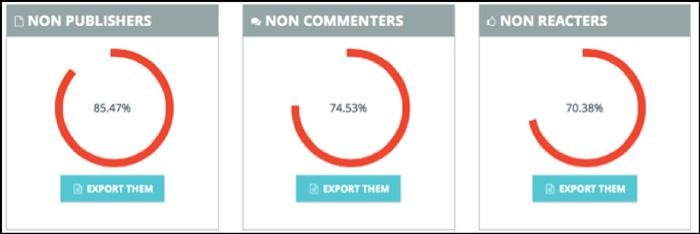
And here’s what those same stats looked like five days later:
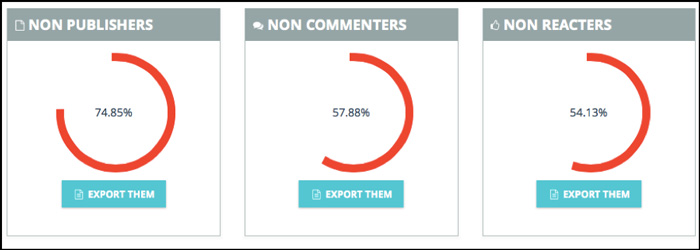
As you can see, my efforts resulted in over 44% activation of previously silent community members—all in just five days.
That means of those members who previously never contributed to our community:
- 11% made their first post
- 17% made their first comment
- 16% initiated a reaction (“liked” a post)
And lots of post like this:
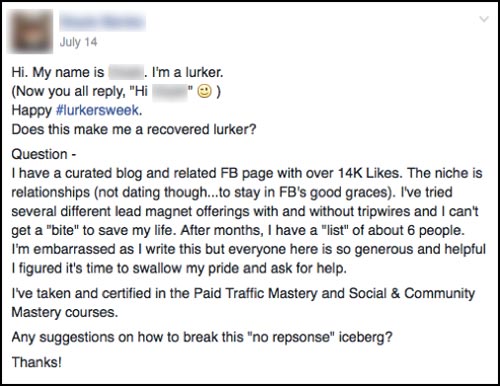
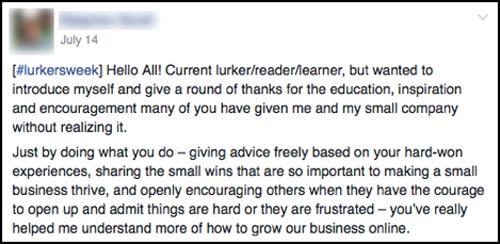

Before we break down the strategy, a quick sidebar:
I’ve written about community management on the DigitalMarketer blog a bit now. I may be starting to sound like a broken record, but for those of you just becoming familiar with community management, let’s pin down what it truly is:
Community Management (noun)
Activities centered around creating a healthy environment for community members to connect with each other and facilitate, strengthen, and encourage those relationships.
All on the same page now? Great! Let’s get into the experiment…
What is a Lurker?
The purpose of this experiment (aptly titled “Love Our Lurkers Week”) was NOT to increase engagement, but to activate users that weren’t reaping the full benefits of our already highly-active community, Digital Marketer Engage.
Like any group, forum, or community, we have our own fair share of lurkers.
According to Webster’s, a “lurker” is defined as someone who reads messages written by other people in an online group, without writing any messages themselves. It’s common Internet lingo for a member of a group, chat, forum, or other online community who does not contribute—neither posting nor commenting.
That’s not so say that lurkers don’t get a tremendous sense of value out of being members of a community. They can read along and still get a sense of satisfaction from being a part of the group.
…So why even reach out to people who don’t contribute if everyone is happy where they are at?
To answer this question, it’s important to understand that there are several reasons why lurkers… well, lurk—and what motivators they need to see to get them contributing.
1. They Don’t Have a Practical Need
Some lurkers don’t have a practical need to contribute to a community. They can get all the answers they need just by browsing. This group is more interested in information than interaction, and is generally reading with a specific goal in mind.
What’s interesting to note is that according some studies, this subset of lurkers can actually feel a strong sense of community, even though they don’t actively participate with other members.
That’s pretty significant—just because a member doesn’t participate doesn’t mean they don’t feel like they are member of a community. If you run your own community, don’t make the mistake of trying to get everyone to post. This group of lurkers is happy right where they are. Let them be!
Target audience for Love Our Lurkers Week? Nope!
2. They’re Getting to Know Your Community
There’s another subset of lurkers who are still learning the ropes and getting to know how things work.
- Will my contribution break any rules?
- What kind of language is appropriate?
- What are other members like?
- What range of topics are discussed?
- What kind of questions are appropriate to ask?
- Is there anyone in this group that I can relate to?
- How do I get additional help if I need it?
All of these questions have to do with community culture. Members in a community want to feel like they fit in, and want to incorporate themselves as seamlessly as possible into the culture.
Target audience for Love Our Lurkers Week? Absolutely! I knew I could make posts that educated this subset about our community to ease the transition from observer to contributor.
3. Social Fear
This is a big one.
Participating in a community can be intimidating, especially if it’s a “Community of Practice,” like DM Engage. A Community of Practice means the members share a craft or profession…in this case, that’s digital marketing.
It’s true—we do have a lot of really smart marketers in our community who are very generous with their time and expertise.
Lurking members might assume that everyone else in the group is more knowledgeable than they are, so they hesitate to contribute out of fear of:
- Asking a question the community will think is dumb.
- Giving advice that the community will perceive as dumb.
There are many interventions a community manager can make when it comes to addressing social fear—easing the minds of this subset of lurkers was one of the main goals of Love Our Lurkers Week.
The Strategy
1. Built Buzz
I didn’t want our theme week to come as a surprise to our active members.
I knew that I would need their buy-in and, more importantly, their help with engaging our lovely lurkers. After all, how lame would it be if I were the only one excited that un-engaged members were suddenly participating? No, we needed to make this exciting for everyone!
I made the first “buzz-building” post about a month before the scheduled Lurkers Week—well, it was part buzz and part getting our community members emotionally involved from the beginning.
It’s simple: I asked if “lurker” was a bad word.
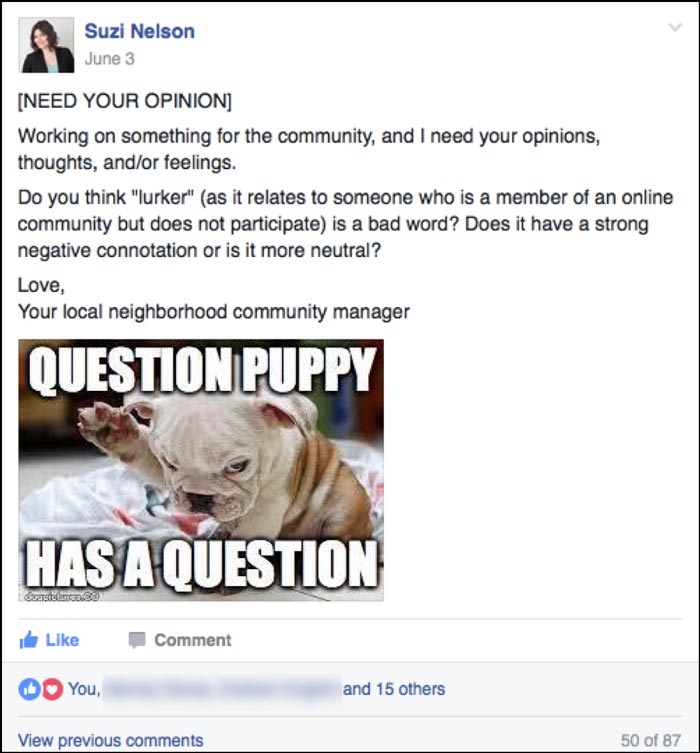
Now, because I had been reading several articles about lurkers over the last few weeks, I had a pretty good idea of what would happen with this post: there would be many voices who did not like the term. It’s a hot-button topic in many community manager circles as leaders try to come up with the most politically correct, least-offensive term for non-participants.
And if you ask a group of 10,000 people what they prefer to be called, you’re going to get a TON of different answers.
Even though I read every single comment and discussed the different terms at length with my team, the REAL reason why I posted it was to get our members thinking and talking about lurkers.
What was surprising was that a lot of self-described lurkers chimed in on the conversation. That was unexpected, but makes sense—we’re talking about them!



In the end, I went with my gut and the “Love Our Lurkers” title stuck. The good news is that no one got upset, and we had members referring to themselves as lurkers before the week was up. No big deal, but the conversion on the post was priceless in getting members primed for what was to come.
I made another crowdsourcing post a week before the event, asking our active members to contribute past posts for our “Legendary Post” list that would go up during Love Our Lurker’s Week.
This was another fun way to get our community hyped up and involved in the whole process.
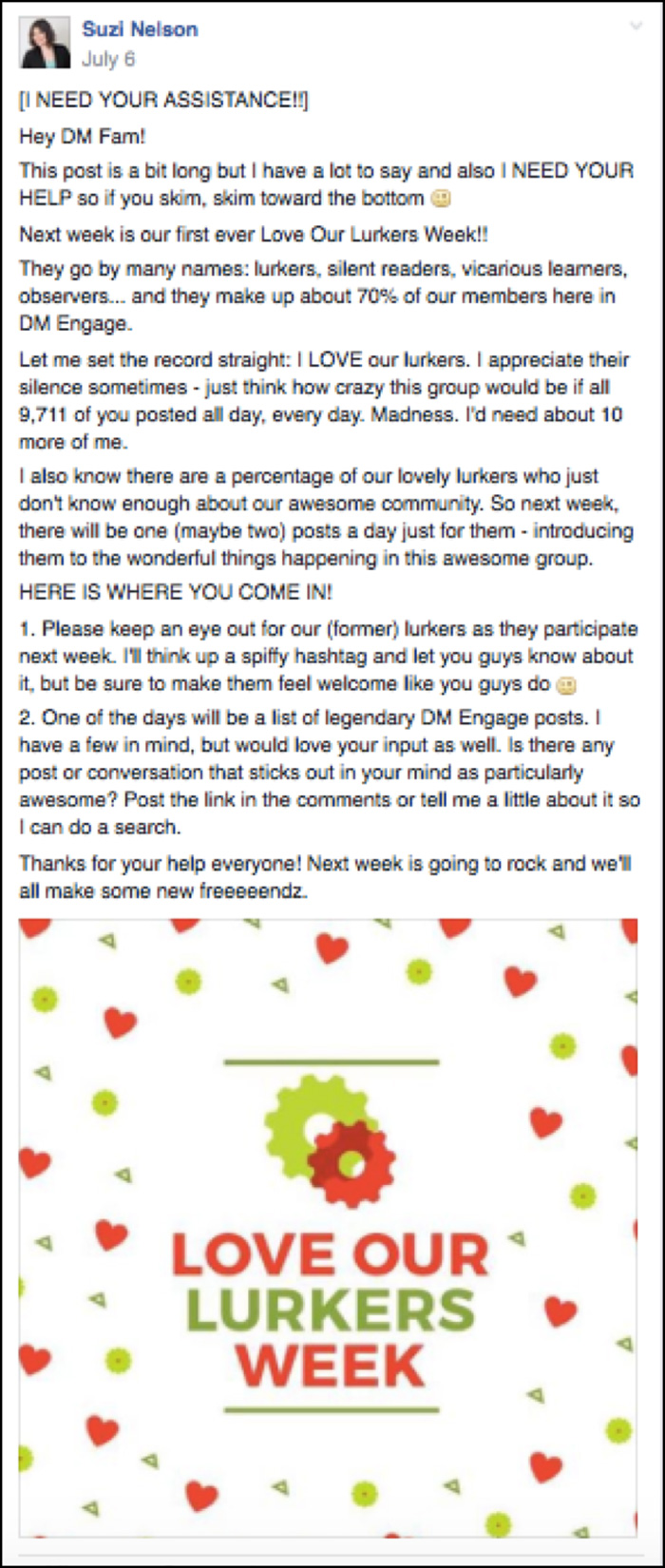
2. Pinned A Post
A Pinned Post is a post that a group admin can “pin” to the top of the group page and it stays at the top until it is removed or replaced by a new post. The idea here is that more people will see whatever is it I need to them see.
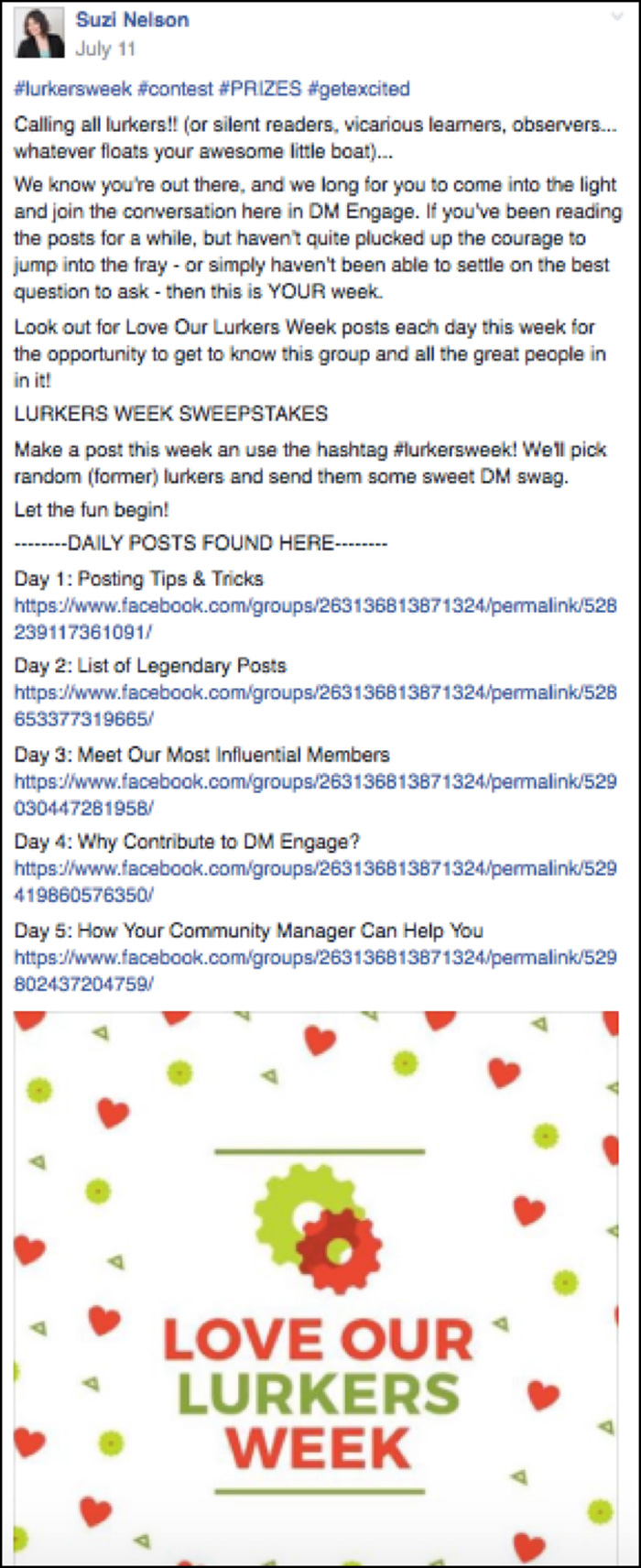
This post outlined what the week was all about, and I updated it daily to include direct links to the daily Love Our Lurkers Week posts. I wanted to be sure that…
- New members knew what was going on.
- Active members got a reminder to look out for new participants.
- Lurkers knew a little of what to expect.
3. Offered A Sweepstakes
At the last minute, I decided that our lurkers might love the additional motivation of a cool prize, so I included a hashtag contest: any non-participates who contributed with the hashtag #lurkersweek were eligible to win some DM swag.
4. Made A Post A Day
Given some of the reasons that community members do not participate—namely social fear and remaining in a state of observation–I wanted my daily post to address these issues directly… and the response was great!
Let’s take a look at the posts and break it all down.
Love Our Lurker’s Week
Day 1: Community Resources
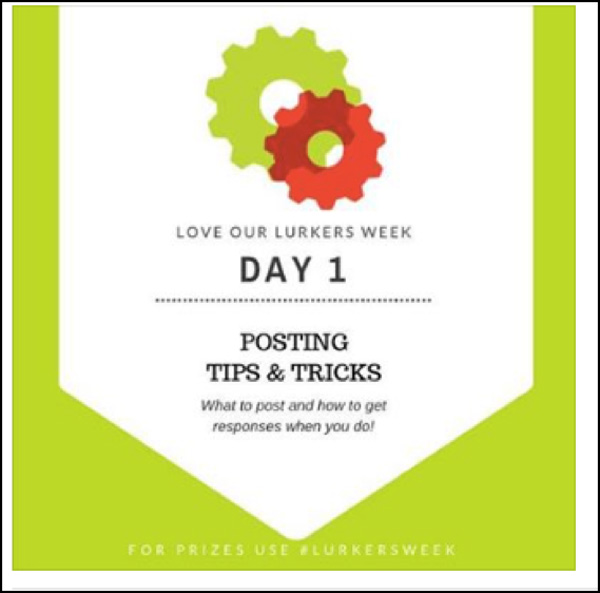
Knowing that there are a subset of lurkers who are looking to get to know the community culture better and address the social fear of sounding dumb, my first post was all about making members feel comfortable contributing.
The post included links to our Community Guidelines and a glossary of common terms found inside the group so non-participants could get to know how the community operates and learn the insiders-only lingo that will plug them right into the “it” crowd of the community.
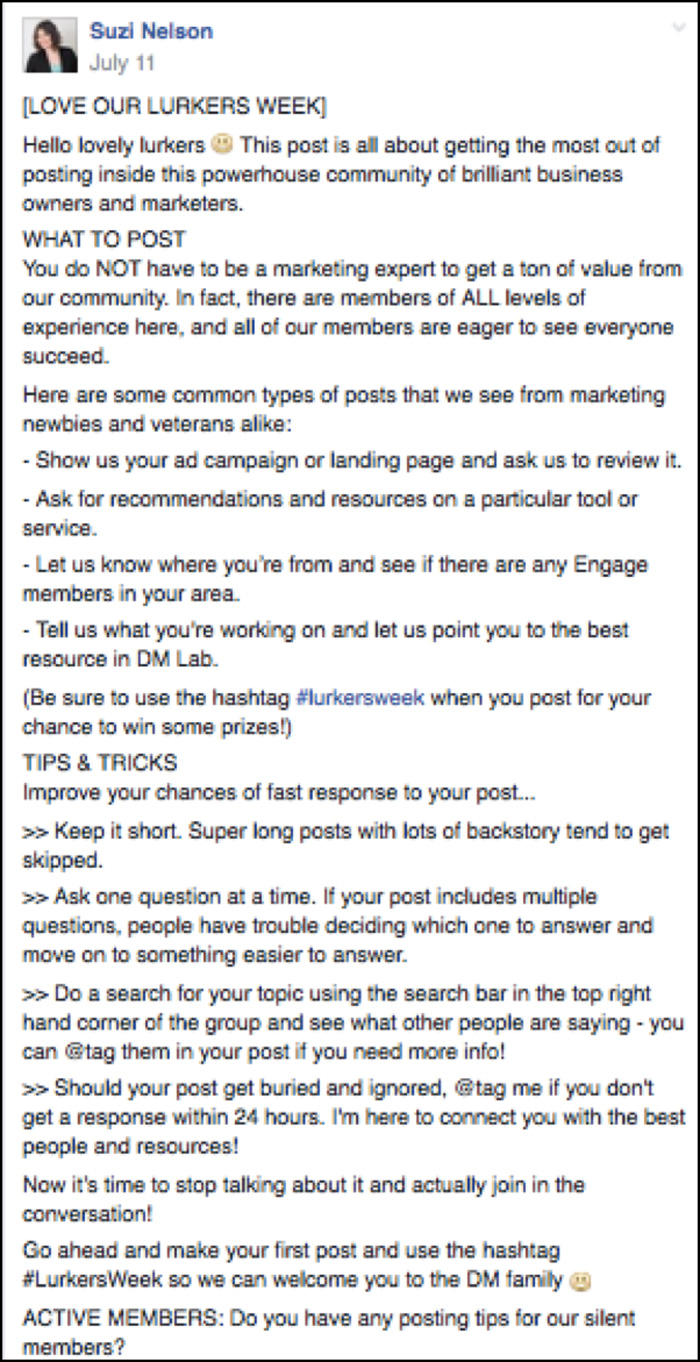
I also included common types of questions that our community members love to answer, and provided tips for getting fast responses to questions members ask in the group.
At the end, I asked our active members to post their own tips for posting. Remember, the goal of community management is to facilitate those member-to-member relationships—so a lurker reading encouragement from another member is way more powerful than any post I can make as community manager!


Day 2: List of Legendary Posts
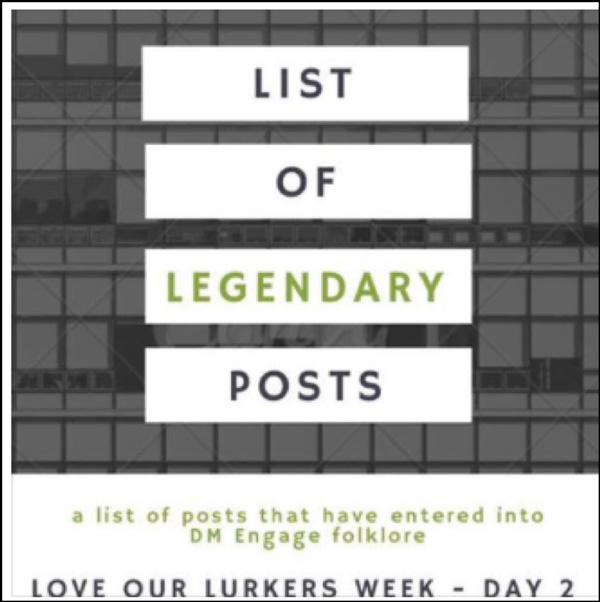
Being able to understand and connect with a community’s past is important for any community member to feel a strong emotional connection to whatever group they are in.
Knowing this, I really wanted to make a list of posts that are referenced often by the community or caused a big stir when they were posted.
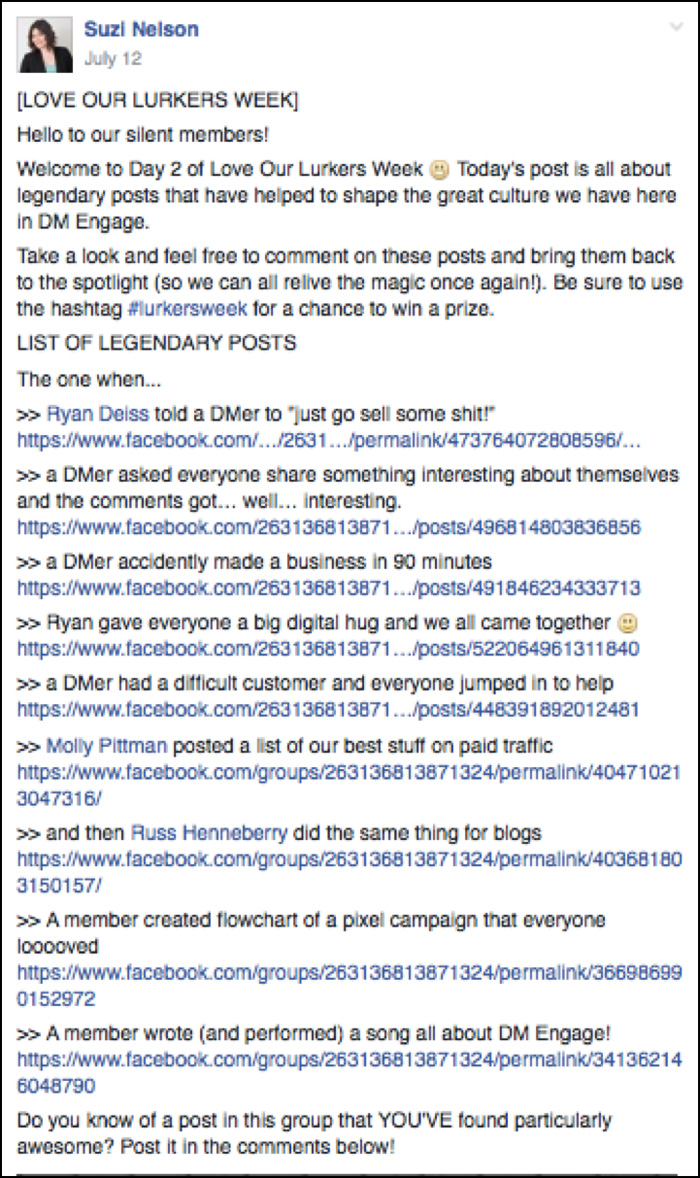
Not only does this familiarize silent readers about how our community works, it also educates these members on the kinds of posts that tend to get the most conversation and engagement.
Day 3: Introduced Group Influencers

This post was all about introducing our non-active members to some stellar members of our community who go above and beyond in helping out other members. I listed what they did, how long they’ve been a member of DigitalMarketer Lab, and their area of expertise.
Not only did this post make our influencers feel very valued (many bragged on their public Facebook profile that they made the list, which was awesome), but it introduced our community’s social hierarchy.
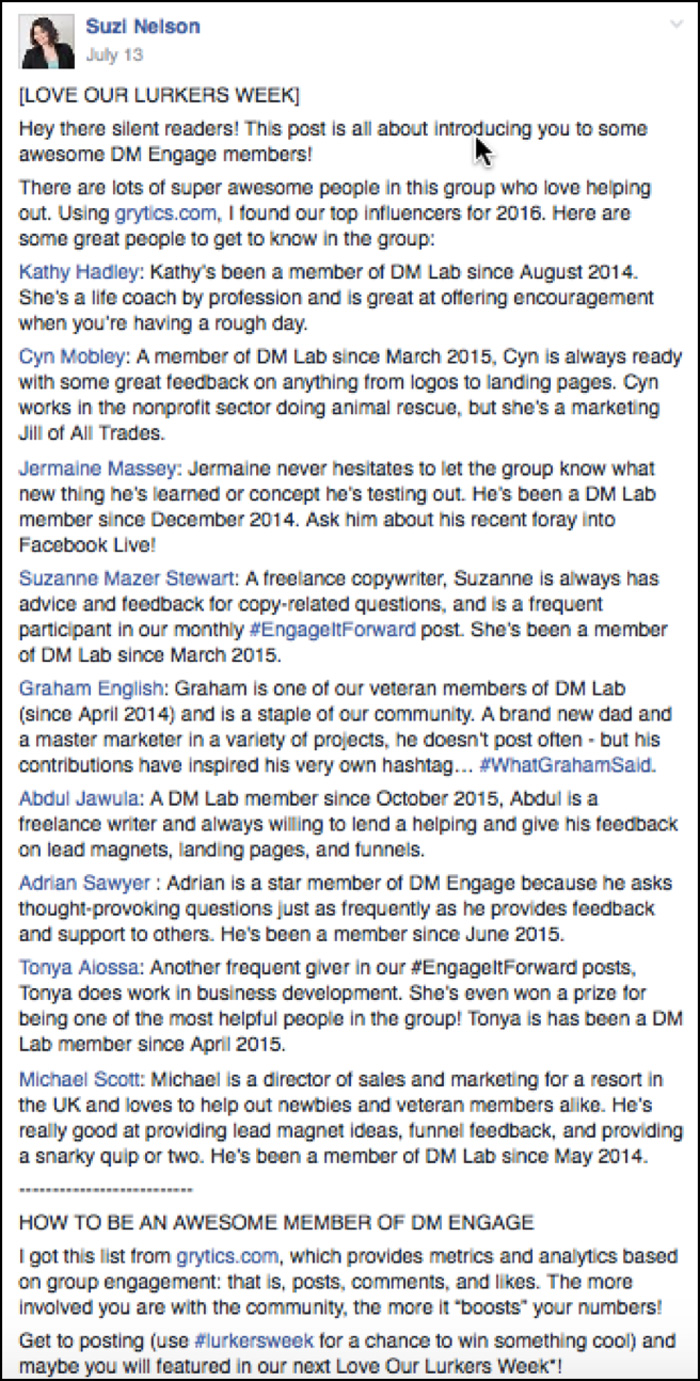
This is dipping a toe into social psychology, so hang with me for a moment.
Social hierarchy is a natural development in any community—online or offline. People tend to sort themselves into a predictable social structure, usually placing more experienced members at the top of the hypothetical ladder.
Encouraging this hierarchy in an online community is a good thing. If the hierarchy is clearly defined, it makes new members (or lurkers) feel like they are working toward a goal and their participation in the community can move them up the social ladder.
Day 4: Social Proof
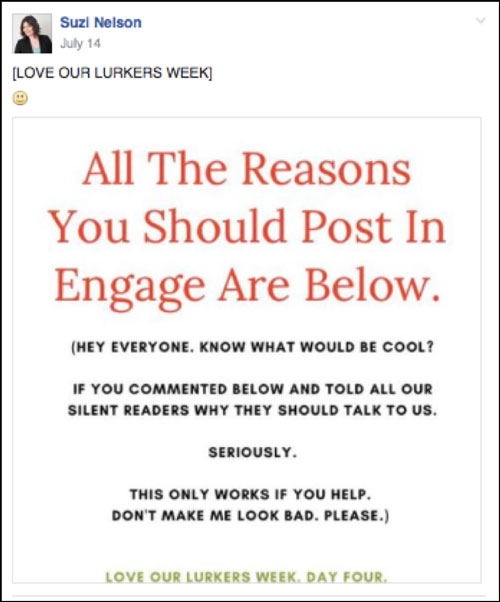
As I mentioned before, nothing is more powerful than hearing from active members themselves on why participating in the community is so valuable.
Getting to know other members is great at combating social fear and motivating any lurkers stuck in that “observation rut”.
Here’s a look at a few of the 30 community testimonials that our members posted:





Powerful, motivating stuff!
Day 5: How The Community Manager Can Help
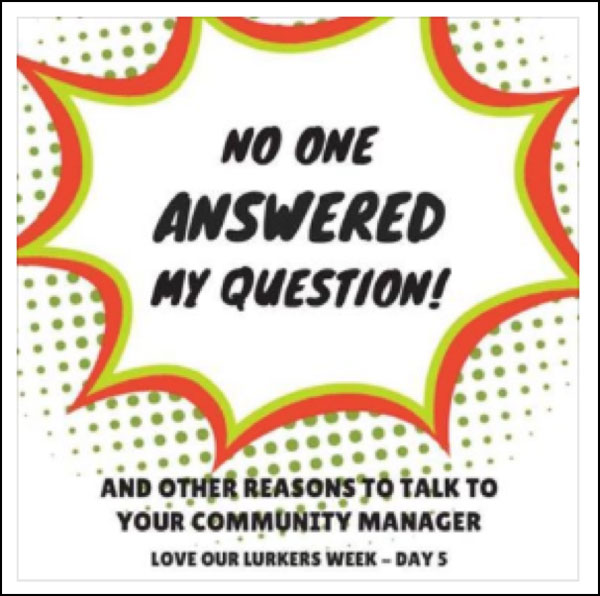
This post was all about how and why any DM Engage member can reach out to me so that they all get the best experience possible in the community.
As this post didn’t do much to directly address community culture OR social fear, it’s easy to see why this post got the least amount of engagement!
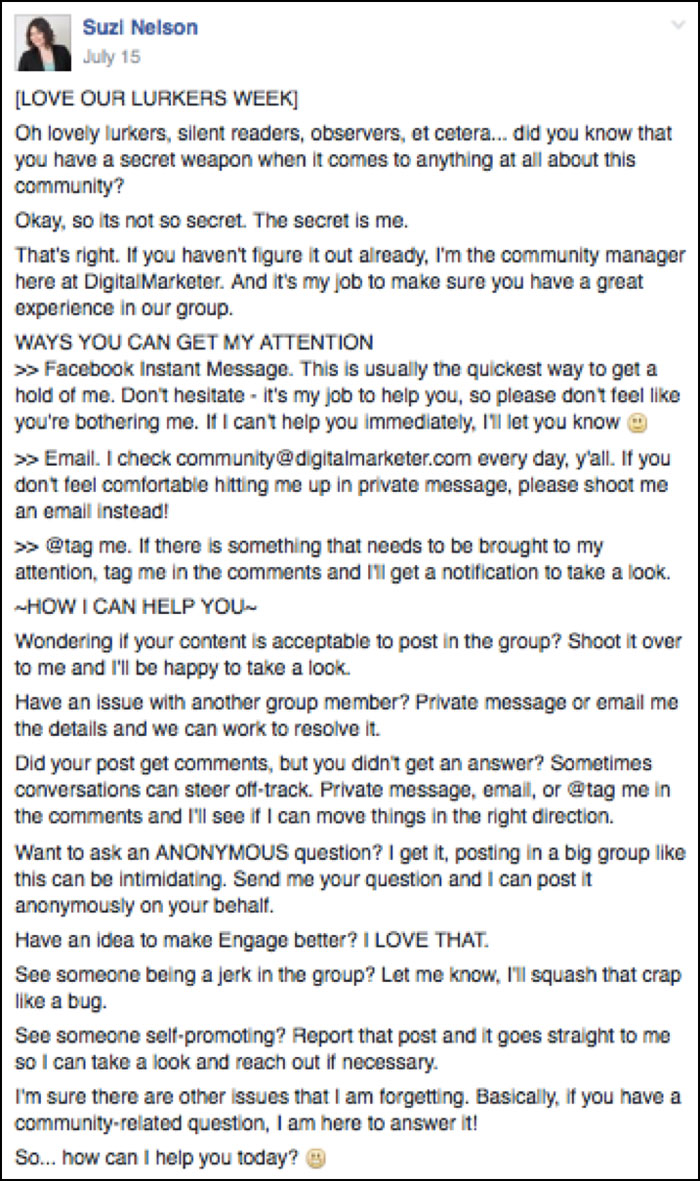
Congratulated Participants
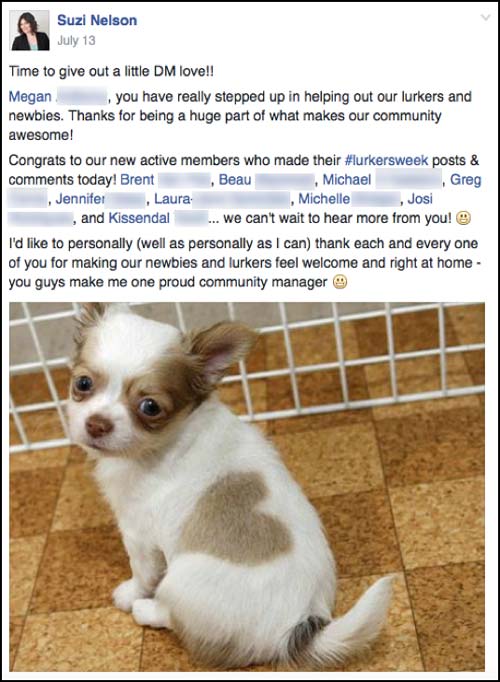
This is a small, but important tactic.
If you want someone to do something a second time, a sure-fire way is to provide a little positive reinforcement. If a member can associate an action with a pleasant emotional response, chances are very good that they will do that same thing again in the future.
The Results
We saw many of our lurkers take varied reactions.
11% made their first post.
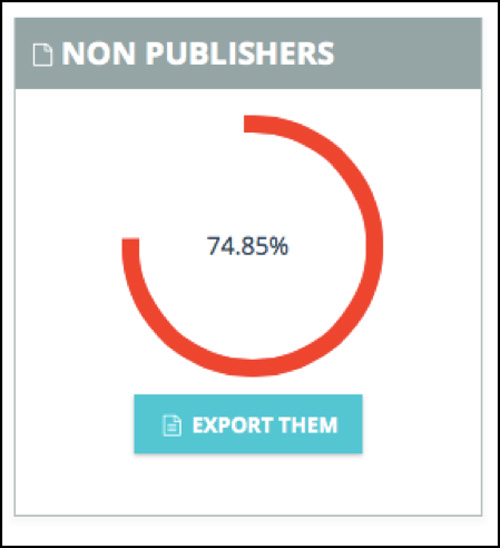
versus…
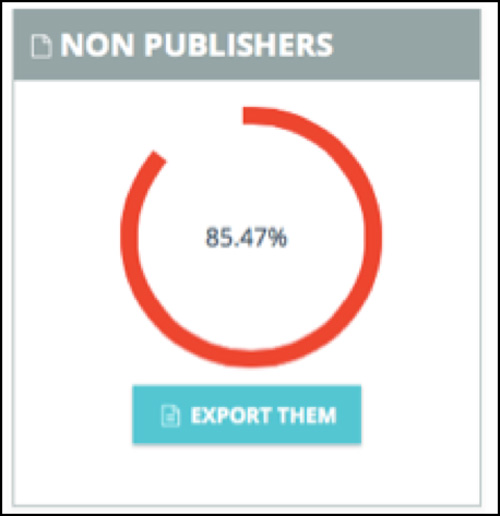
We saw people self-identify as a lurker, and share what’s been on their mind, what they’re working on, and what kept them from posting in the group for as long as they did.
17% made their first comment.
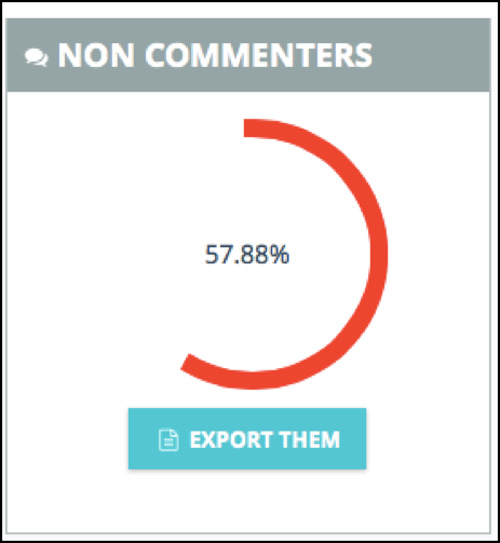
versus…
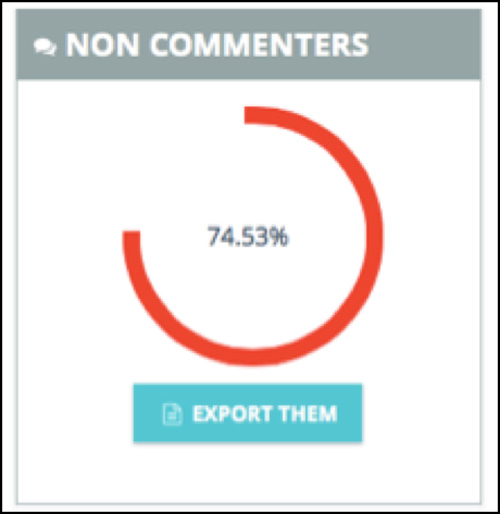
These were people that commented on someone else’s thread—whether it be my lurkers week thread or a post from another Engage member. They started sharing their expertise, their experience, and weighing in wherever they could (this included newbies to the group and newbies to the market).
We had plenty of people start participating and explain that they hadn’t been weighing in on the conversation because they didn’t think they knew enough to weigh in intelligently.
There were also people who knew A LOT, but were just self-doubting and assuming someone else had a better answer. Isn’t everyone afraid of being wrong at some point?
16% initiated a reaction.
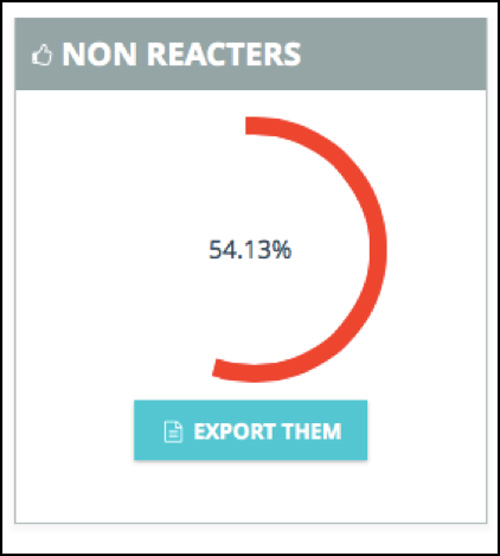
versus…
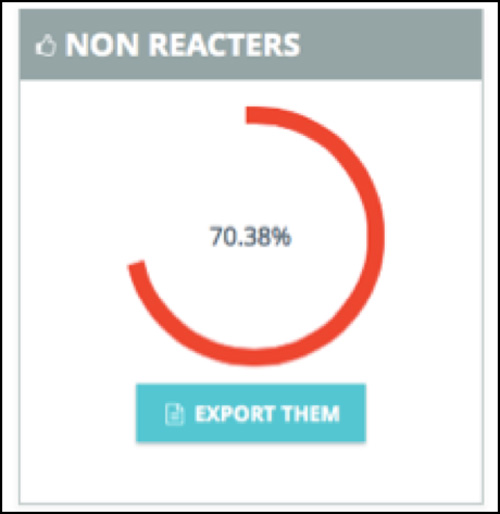
This may not seem like a lot, but we’re talking about 16% of 10,000 people that had never so much as liked a post before.
Every potential active user in your community needs to take their first step somewhere.
It can all start with a Like.
The post [CASE STUDY] How DigitalMarketer Activated 44% of Previously Silent Community Members in 5 Days appeared first on DigitalMarketer.
About us and this blog
We are a digital marketing company with a focus on helping our customers achieve great results across several key areas.
Request a free quote
We offer professional SEO services that help websites increase their organic search score drastically in order to compete for the highest rankings even when it comes to highly competitive keywords.
Subscribe to our newsletter!
More from our blog
See all postsRecent Posts
- Web Hosting September 26, 2023
- Affiliate Management September 26, 2023
- Online Presence Analysis September 26, 2023


